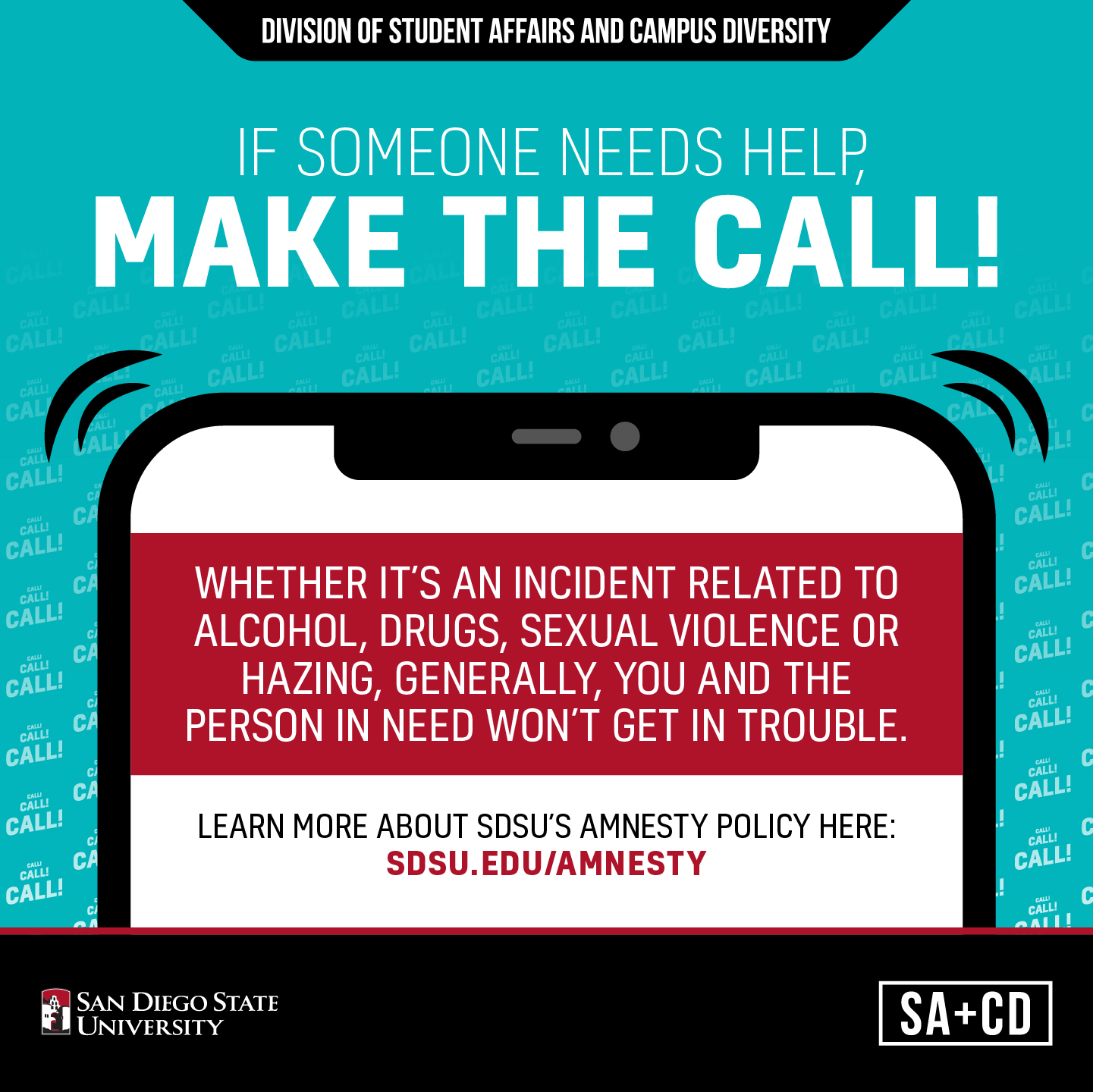Amnesty Policy

IF SOMEONE NEEDS HELP, MAKE THE CALL!
Whether it's an incident related to alcohol, drugs, sexual violence or hazing, generally, you and the person in need won’t get in trouble. Call 911 or your Residence Hall staff.
The Amnesty Policy represents the University’s commitment to encouraging campus community members to report incidents of sexual violence, alcohol or other drug-related emergencies, and incidents of hazing. Every student, as a part of the SDSU community, has a responsibility for care for self and others. The primary concern of the University is the health, safety and well-being of our students.
San Diego State University has a responsibility to hold students accountable for violations of the Student Code of Conduct. The potential for student disciplinary action against a student reporting an incident of sexual violence or hazing, and/or for a student in need of medical attention due to alcohol and other drug consumption may act as a barrier to students getting the immediate assistance they need. In order to alleviate the behavioral consequences commonly associated with alcohol and other drug emergencies, and to encourage students to seek needed assistance, the University has implemented an Amnesty Policy. This policy applies to students in need of immediate assistance in the form of either 911 medical response or alleged victims and witnesses of sexual violence and hazing.
Alleged victims and witnesses should not be deterred from reporting any instances of Sexual Misconduct, Dating or Domestic Violence, Stalking, or Hazing due to concern they may be subject to discipline for related violations of drug, alcohol, or other University policies. The University’s primary concern is the safety of the campus community; therefore, a person who participates as a Complainant or witness in investigations or proceedings involving Sexual Misconduct, Dating or Domestic Violence, Stalking, or Hazing may not be subject to discipline for related violations of the Student Code of Conduct at or near the time of the incident unless the University determines the violation was egregious.
In order to receive amnesty, students must use this policy proactively. This means students must take the initiative to get assistance. Students who request amnesty only after being met by police or staff will not be eligible for amnesty.
The Amnesty Policy applies to the University’s student discipline process. The University will continue to fulfill all legal obligations in reporting incidents to appropriate University and law enforcement officials (i.e. Title IX and Clery).
While the student may not be assigned sanctions, the incident will be documented, the student may be requested to meet with University staff, and educational outcomes may be required.
For the Student in Need of Assistance
Generally, a student reporting an incident of sexual violence or hazing or calling for medical assistance at the time of an incident, will not be subject to student conduct charges related to alcohol or other drugs. A student transported to the hospital, jail, or detoxification facility may be required to meet with a Student Affairs professional and may be required to pursue educational remedies regarding alcohol or other drugs.
For the Bystander/Caller
Generally, a student who calls for medical assistance on behalf of someone else will not be subject to student conduct charges related to alcohol or other drugs.
The University expects all campus community members to take reasonable and prudent actions to prevent or stop an act of sexual violence, sexual harassment, relationship abuse, or hazing. Taking action may include direct intervention, calling law enforcement, or seeking assistance from a person in authority. Students who choose to exercise this positive moral obligation will be supported by the University and protected from retaliation.
Examples of Amnesty Policy Usage
An example of a situation that may qualify for amnesty includes, but is not limited to:
Students A and B are both under the age of 21 and drinking alcohol. Student B has consumed a large quantity of alcohol and is drifting in and out of consciousness. Student A has been drinking alcohol as well. Student A contacts their Resident Advisor to solicit help for Student B.
Will Student B receive a disciplinary consequence as a result of their underage alcohol consumption? Generally, no. This behavior likely qualifies for amnesty.
Student A was drinking while underage, too. Will they receive a disciplinary consequence? Generally, no. Since Student A was seeking help for Student B, their own behavior will likely qualify for amnesty.
Below is an example of how the Amnesty Policy and Good Samaritan Policy would address an incident involving both individuals and organizations.
Student C is a member of a student organization and overhears several of their members making plans to have new members drink a fifth of vodka before initiation. During the pre-party, Student C brought beer to share with new members. Hearing the plan for new members to drink an excessive amount of alcohol, Student C becomes concerned about the quantity of alcohol some of the members are encouraging others to consume.
If Student C reports the behavior, will they receive an individual disciplinary consequence for providing the new members with beer? Generally, no. If Student C reports the incident, their behavior will likely qualify for amnesty.
What about the organization? If the incident is determined to be related to individual behavior as opposed to organizational behavior, generally no; the organization as a whole will not receive a disciplinary consequence. If the incident was organizational in nature and the organization followed the protocol outlined in the Good Samaritan Policy, then generally no, the organization will not receive a conduct record for alcohol and other drug violations.